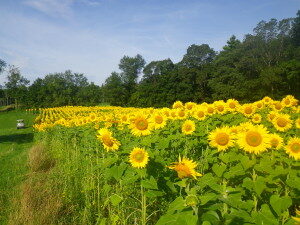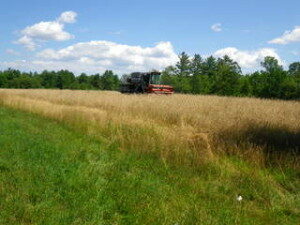
“When it comes to agriculture in NH, we are like an underdeveloped country.” So says Dorn Cox who is currently making a concerted effort to push farming squarely into the 21st century by building what he refers to as a “biological system” for his farm; it is a most singular system and very much a family enterprise. By successfully integrating the disciplines of plant biology and environmental engineering, Dorn is working to tighten the carbon cycle while also reducing production costs, and limiting off farm purchases which will make the farm more self sufficient.
For those who are unfamiliar with what the words “carbon cycle” mean, simply put, it is the biological process by which plants absorb carbon dioxide from the atmosphere, store it as biomass in the form of plant material (such as roots, stalks, and leaves) and pass it along through the food chain as it is consumed by animals or returned into the atmosphere through decomposition in the soil. Any carbon that is not consumed or fully decomposed contributes to building new topsoil.
Dorn’s efforts to develop bio-diesel fuel, and other farm produced biofuels and develop locally grown grain are part of a desire to create a complete carbon cycle and build basic agricultural infrastructure resulting in a secure food and energy system. In establishing what he calls a resilient farm, he is setting an example for other farms in New Hampshire and perhaps the nation. “New Hampshire is growing food on less than 7% of its agricultural soils which produce less than 5% of our food, and yet we send almost three billion dollars out of the state for food every year . The same basic situation is true for energy as well. Think how much opportunity that leaves for local farmers to grow products for their own state in an environmentally sound and healthy way, to assure a food secure future, a beautiful working landscape and a great way of life.”
Dorn first began his, what many thought to be uncommon, environmental efforts over ten years ago by developing a bio-diesel production and education facility. His most successful bio-diesel fuel is from vegetable oil collected from restaurants and he grows sunflower and canola which is pressed and sold to some of the same restaurants as a premium cooking oil. The oilseed crops have been incorporated into the farm’s crop rotations. “For example,” he says, “we plant a fall cover crop, roll it down when it starts to flower in the spring, which kills it and creates a weed suppressing mulch which we are able no-till seed sunflowers into. We harvest the seeds, press them for high protein animal feed and oil. In an ideal year, Spring wheat or oats can then be no-till drilled after the sunflower which provides grain and straw. The fields then go into legume forages and begin the cycle all over again.” To promote the use of on-farm bio-diesel fuel, Dorn is the Executive Director of of GreenStart, a non-profit organization that is working to foster a resilient energy and food system for New Hampshire by providing technical education and practical agricultural examples.

His next effort towards achieving a healthier agricultural system was to develop a variety of wheat that could thrive in New Hampshire. However, because growing grains in a New England state is incredibly capital intensive, a team of interested farmers formed the Great Bay Grain Co-operative to be able to share equipment and discuss their growing experiences. Dorn himself grows nine or so types of wheat, as well as oats, barley, spelt, rye and triticale, but further research needs to be done to determine which varieties are most productive in this region and on which soils. Most of the oats grown today goes to the animals for feed because it is not necessary to perform the time consuming task of de-hulling, but much of the spring wheat is now being milled into bread flour. By developing the appropriate varieties of grain, and building the proper processing equipment suitable for small farms, good storage facilities, and distribution, the Great Bay Co-operative farmers have already started to provide freshly milled flour for New England kitchens and bakeries.
Tuckaway Farm was purchased by Chuck and Laurel Cox in the 1970s The family bought the adjoining 150 acre Randall homestead in 2003 which was established in 1719 and had been farmed by 10 generations of Randalls. Today four generations of the Cox family live on 250 acres including Dorn’s grandmother and young son Andreas. It is a remarkably diversified farm. Chuck Cox, Dorn’s father is a pomologist and tends to the fruits, haying, and timber on the property. He and Dorn also oversee the water-pumping wind turbine which pumps to a cistern and that gravity feeds water to the animals and crops. Chuck’s wife Laurel has taken up the cause of land conservation. Two hundred acres of Tuckaway Farm have been put into conservation under New Hampshire’s Land and Community Heritage Investment Program (LCHIP) as part of a larger town wide preservation project, which has put 20% of the towns land into agricultural easements. And Dorn, the environmental researcher, says that after success on the production side of grain he will continue to work on expanding the market. And, as for caring for the livestock, all the family shares that responsibility.
Nor is the sporting life neglected; the Wentworth Hunt Club makes its home at Tuckaway for fox hunting and in as much as the farm houses kennels, when the dogs are not on the chase, the clamor of a lively pack can do wonders at keeping unwanted critters out of the nearby grain barn.
Tuckaway Farm
Cox Family
59 Randall Road Lee, NH
603-868-1822
603-397-5186
